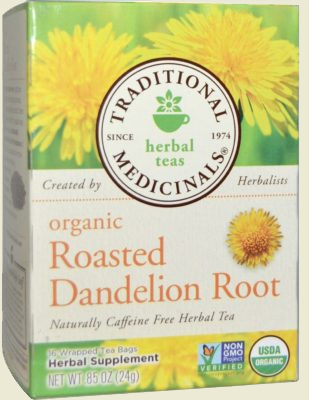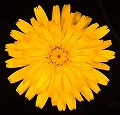Some of the many traditional benefits of dandelion tea, just for starters:
- Dandelion tea tastes good (especially with a sweetener like honey or sugar—or, a good taste with a no-carbohydrate choice, like xylitol).
- Dandelion tea benefits your health (in fact, it’s very good for you)—as health enthusiasts world wide can attest for this delicious herbal remedy.
- Dandelion tea forms a prime medical ingredient in over half the phytonutrient blends on the market (weight loss, rejuvenation, detoxification; digestive, liver, kidney, & skin supplements).
- Dandelion tea uses include as an ingredient in cooking.
- Dandelion tea aids in digestion, and functions well to relieve digestive disorders like constipation and diarrhea.
- Dandelion tea works great to purify the blood and cleanse the system.
- Dandelion tea enhances detoxification, by stimulating urination and, in addition, by replacing the potassium lost in that process.
- Dandelion tea is one of the most effective herbs for getting the bloat out and helping relieve water retention.
- Dandelion tea has specific action inreducing inflammation, of the gall bladder and of the bile duct, and for rheumatism and arthritis.
- Dandelion tea improves the function of and maintains optimum liver, kidney, pancreas, spleen, stomach, and gall bladder functions.
- Dandelion tea helps in treating chronic hepatitis and jaundice disorders, and encourages healing of damaged tissues caused by alcohol liver disease.
- Dandelion tea helps reduce high cholesterol.
- Dandelion tea contains antioxidants that help your body fight off toxic bacteria and viruses.
- Dandelion tea helps with weight control—especially with weight loss.
- Dandelion tea strengths incorporate well into muscle building programs for weight lifters.
- Dandelion tea actively ameliorates disease—it is a potent disease-fighter—and helps the body heal, helps boost immunity, and combat cancer, heart disease, and age-related memory loss.
- Dandelion tea aids health maintenance for people suffering from Type-1 and Type-2 diabetes.
- Dandelion tea transfers magnificent amounts of minerals and vitamins: A, C, D, E, & B complex, calcium, potassium, magnesium, iron, zinc, manganese, copper, choline, and boron, etc. when infused in hot water.
- Dandelion tea can be made solely from the blossoms, the leaves, or the roots (roasted or not)—or, the entire plant.
- Dandelion tea is traditionally served plain (as is), and also made into other beverages—like ale, beer, “coffee”, and wine.
- Dandelion tea as a face wash cleanses complexion, improves skin clarity.
- Dandelion tea makes a great bath addition, especially when made from older, stronger (tougher) leaves.
- Dandelion tea can serve as an inspiration for a great tea party!
- Making dandelion tea by gathering fresh plants is good exercise (and, some people say, improves the look of your lawn).
- Composting spent dandelion tea blossoms, leaves, and/or roots, after drinking your dandelion tea, improves soil composition.
Are you ready for Dandelion Tea? Do you want its health benefit rewards?
You can purchase it on our site now for a reasonable price!
Tea, the world’s second most commonly consumed beverage, ranks next to water.
We welcome your comments! We want to hear how dandelion tea benefits you!
Just about everybody knows what a dandelion is. In the western world it is a weed, but in many other societies it is an important herb that is used to treat many common diseases and conditions of the human body.
It is also a food, being used in salads and the roots are also used by some as a coffee substitute the same as chicory. It is also used to make a herbal tea, and most people have likely heard of dandelion tea. However, its medicinal properties are not so well known, even though it has been use for hundreds, if not thousands, of years for the treatment of many conditions including those associated with the gall bladder, liver and kidneys.
However, that is not all, and there are several more traditional uses of dandelion in the folk medicine of many different countries including conditions as diverse as water retention and eczema. So, taking all of this into consideration, what exactly are the main benefits of dandelion to the body and what is it that provides these benefits?
Dandelion contains its fair share of minerals and vitamins, and is rich in vitamin C of course, with its strong antioxidant properties. It also contains the antioxidant vitamin A together with several B vitamins and the sunshine vitamin, vitamin D, which is so important for the absorption of calcium by the kidneys and into the bone structure. The minerals it contains is like an encyclopedia entry of minerals important to the human body. It’s not so much what minerals dandelion contains, as what it doesn’t contain.
The list includes phosphorus, iron, magnesium, calcium, potassium, silicon, manganese and boron, and the organic nutrients include lecithin, carotenoids, terpenoids, tannins, sterols, choline, inulin, aspargine and so on. It would take a whole book to describe the health benefits of each of these, but an attempt will be made later to discuss the more important of them.
Suffice it to say that the list contains antioxidants, anti-inflammatories, and substances that help to reduce blood cholesterol levels and also maintain the health of your blood and major organs. However, the effect of dandelion on the liver and the digestive system are due largely to substances known collectively as taraxacin. That is what gives dandelion its bitter taste.
What was once known as taraxin, is now known to consist of sesquiterpene lactones known as eudesmanolide and germacranolide, which although claimed to be unique to the dandelion, are very similar to other sesquiterpenes found in chicory. In fact, dicaffeolquinic acid and chicoric acid (dicaffeoyltartaric acid) have been found to comprise a significant proportion of the extract from dandelion roots, together with a number of phenolic acids and flavanoids. Each of these, of course, is important and effective antioxidants, responsible for many positive health effects in the body.
Among the more important of these is the stimulation of the circulation of the blood throughout the body. The sesquiterpenes are also believed to support the activity of the pancreas, and the presence of so many strong antioxidant species within the leaves and roots of the dandelion explains the traditional use of dandelion for the treatment of inflammatory diseases.
Antioxidants support the immune system that causes inflammation when it is under stress. Studies of rats have indicated that dandelion is effective in reducing acute pancreatis, which is itself an inflammatory condition. The large querticin glycoside and flavanoid content of dandelion root extract posses anti-inflammatory properties, and suddenly dandelion is beginning to take on the appearance of a ‘wonder plant’.
However, let’s get away from the technical stuff for a while, and check out exactly what you can use dandelion for. Pregnant and post-menopausal women can gain the benefit of all these nutrients detailed above by taking dandelion extract, and it also has a diuretic effect. Although mild, this can help to remove excess water from the body, and helps to reduce blood pressure and the effects of heart problems. LDL cholesterol levels can be reduced by virtue of its anti-oxidant properties, and can help to resolve minor digestive complaints.
Traditionally it is claimed to have been used as a laxative and a cure for rheumatism. The latter can be explained by its antioxidant effects, and the way the sesquiterpenes reduce the inflammation associated with rheumatism. It is this inflammation of the tissues that causes so much of the swelling and pain of rheumatism and arthritis. Anti-inflammatories help to reduce this effect.
Dandelion is also believed to stimulate the flow of bile from the gall bladder to the duodenum, and help promote the digestion of fats and oils, thus alleviating many of the digestive problems associated with a fatty diet. This also appears to have the effect of stimulating the appetite, and dandelion juice is frequently drunk before a meal for these reasons. It is believed to help bladder and kidney stones, and also helps to alleviate infections of the urinary tract.
Although dandelion is normally safe to take, those with problems associated with the bile ducts should not take it, and if you are already on diuretic drugs, or any medicines designed to lower your blood pressure, you should stay clear of dandelion extract. The same is true if you are taking lithium for manic depression since some of the components of dandelion juice can exaggerate the side effects. It is also recommended that diabetics do not use dandelion extract, and neither should anyone on blood thinning drugs such as Coumadin, or any other form of warfarin.
Although dandelion can be a very effective natural remedy for many conditions, you should always refer to your physician before taking it, since it could interfere with any medications you are currently taking. Your doctor might also be aware of certain medical conditions you have that, while you are not being treated for, could deteriorate in the presence of one of the constituents of dandelion extract.
Although all of this could suggest that dandelion is dangerous to take, in fact what it indicates is that it is very effective against many conditions, and that taking it could lead to the effects of an overdose of the treatment you are already on. Had it not so many contra-indications, dandelion wouldn’t be as effective at doing what it does.
About the Author More information on dandelion root tea is available at VitaNet ®, LLC Health Food Store, vitanetonine.com.
“Siyaram Pandey, a biochemist at the University of Windsor, has been studying the anti-cancer potential of dandelion root extract for almost two years.
His team’s first phase of research showed that dandelion root extract forced a very aggressive and drug-resistant type of blood cancer cell, known as chronic monocytic myeloid leukemia, to essentially commit suicide.
Researchers then discovered that repeated treatment with low dose dandelion root extract was effective in killing most of the cancerous cells”
Cancer-killing dandelion tea gets $157K research grant
When life gives you lemons make lemonade. If you lawn gives you dandelions, make dandelion tea! [common dandelion Taraxacum officinale]
PREPARATION
Once you pick the dandelion greens, wash them thoroughly to remove dirt particles.
When clean, store them in a plastic bag which has holes punched for circulation, keeping them cold and humid. Use them as soon as possible, since greens are quite perishable.
Select young, tender leaves for the tastiest dandelion tea.
Individual portion
Pour:
1 cup boiling water
Over:
1 teaspoon dried dandelion leaves
For a pot of tea
Pour:
1 cup boiling water for each person
Over:
1 teaspoon dried dandelion leaves for each person
Throw in:
1 teaspoon dried dandelion leaves “for the pot”
Cover and let steep 3 minutes. Stir and let steep another minute.
Serve with your choice of:
(lemon)
(orange)
(mint)
(honey)
Or, buy some Dandelion Tea Bags now
Notes:
Use a non-metal pot, if possible.
Never boil tea.




